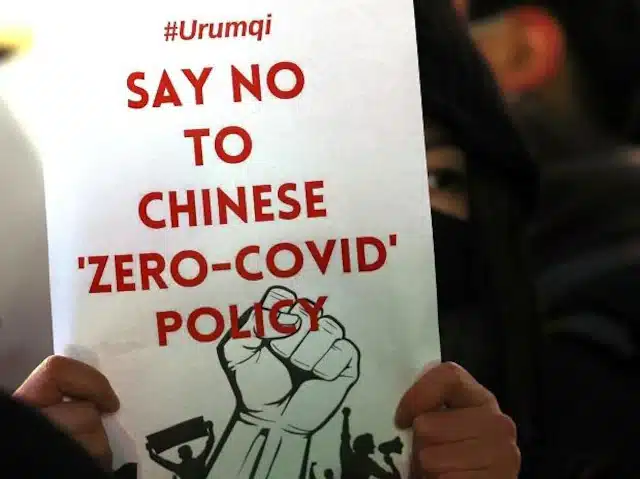Amid growing public discontent with the measures, some Chinese cities are cautiously easing anti-pandemic restrictions.
China announced two more COVID-19 deaths on Sunday as some localities tentatively relax anti-pandemic regulations in the face of growing public resentment over the tactics.
According to the National Health Commission, Sichuan and Shandong provinces each recorded one death.

There was no information provided regarding the victims’ ages or vaccination status.
China, the final major nation attempting to entirely stop transmission through quarantines, lockdowns, and mass testing, is where the virus was initially discovered in mid-2019 in the city center of Wuhan. The Communist Party in power is reportedly determined to adhere to its rigorous stance due to concerns about immunization rates.
Covid deaths have occurred
According to the commission, just 66% of persons over 80 have received one vaccination, and 40% have received a booster. This is despite the fact that 90% of Chinese people have received vaccinations. It said that 86% of those over 60 are immunized.
Some worry that if limitations were completely eased, millions of people could die due to these statistics as well as the fact that only a small percentage of Chinese have developed antibodies after being subjected to the virus

Even so, the authorities claim that the zero plan, which strives to segregate every infected person, is still in effect. Nevertheless, a demonstration of public outrage appears to have led them to ease a few of the more onerous limitations.
For first time in months, passengers in Beijing and other Chinese cities can board buses on subways without having to take a virus test.
The subtle relaxation of testing standards continues to follow weekend protests across the nation by citizens fed up with the harsh penalties of generally pro-constraints that are entering their fourth year while the remainder of the world has opened up. This comes despite daily virus infections reaching nearly record high levels.
Shenzhen, a center of technical production in the south, announced on Saturday afternoon that commuters no longer need to have a clean COVID-19 test result to utilize public transportation or attend pharmacies, parks, and tourist sites.

Beijing, the nation’s capital, announced on Friday that starting on Monday, negative test results will also no longer be necessary for public transportation. The entrance to shopping complexes, which have progressively reopened with numerous restaurants and cafés offering takeout, still requires a negative result acquired within the previous 48 hours.
Some Beijing residents have complained about the need because they feel that most public places should not still require COVID-19 examinations, despite the city closing numerous testing locations.
China reported an additional 35,775 cases from the previous day on Sunday, 31,607 of whom were asymptomatic, bringing the country’s total to 336,165 cases with 5,235 fatalities.
Although many have asked for the precision of the Chinese statistics, they still represent a low number when tried to compare to the US and other countries, which are now easing restrictions as well as attempting to live with the virus, which has sickened nearly 650 million people as well as killed over 6.6 million people worldwide.

Authorities in Beijing stated on Saturday that because COVID-19 is spreading quickly, it is imperative to steadfastly keep up the implementation of standard social preventive and control measures.
China is the only major country that continues to adhere to a negligible strategy even as rest of the world has learned to deal with the virus. Since the outbreak began, the approach has resulted in widespread testing and sudden lockdowns around the nation.
Even though the number of infections in China is tiny in comparison to its population of 1.4 billion, the country nonetheless requires foreign visitors to stay in quarantine.
After a fire broke out in an apartment complex in the northwest Chinese city of Urumqi on November 25, the most significant and widespread rallies in decades broke out. That sparked irate online comments about whether door locks or other anti-virus measures prevented firemen or victims from fleeing. Authorities refuted that, but the fatalities came to represent the public’s ire.
The administration of Xi Jinping has pledged to keep its commitment to zero COVID while lowering the expense and disruption of controls.
In order to prepare for the easing of restrictions that prevent the majority of visitors from entering China, millions of elderly adults are being immunized. Medical authorities and economists anticipate it to remain in place through mid-2024 and probably into 2024.
While the administration has acknowledged some errors, primarily attributable to overzealous officials, celebrities, businesspeople, regular residents, and even athletes have suffered consequences for questioning the direction of government policy. According to local media sources, retired NBA star Jeremy Lin, who actually plays for such a Chinese team, was just fined 10,000 yuan ($1,400) for disparaging the state of team quarantine facilities.
Dr. Michael Ryan, director of the World Health Organization’s emergency department, stated on Friday that the UN agency was delighted to see China relax a few of its coronavirus prohibitions and that it is crucial for governments to pay attention to their citizens when they are suffering.












